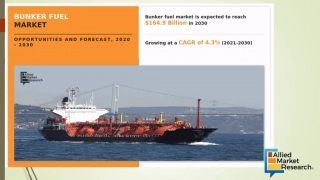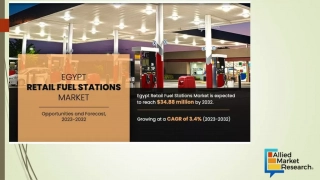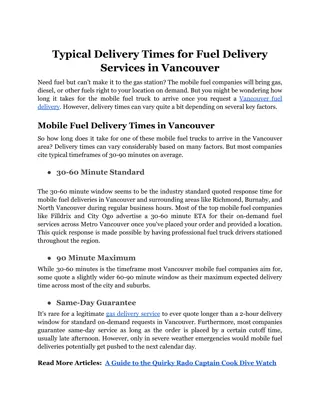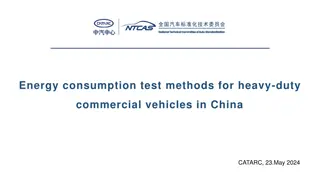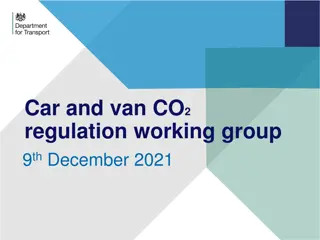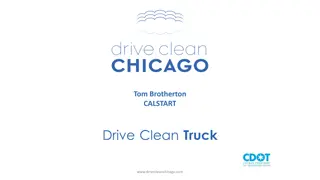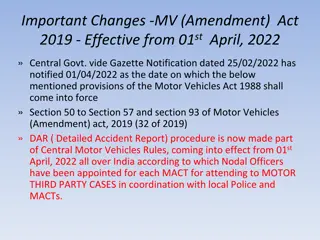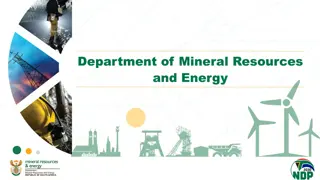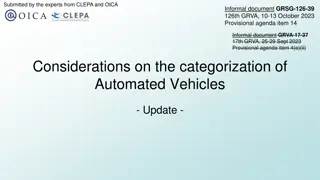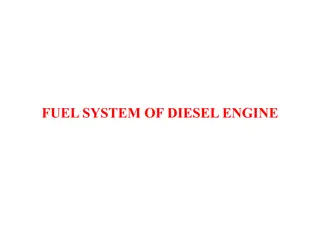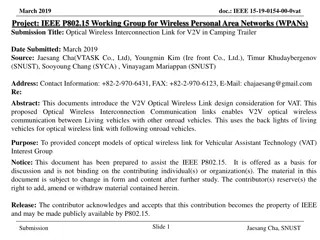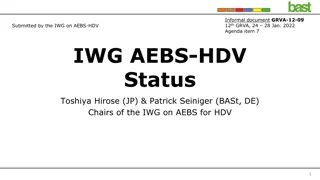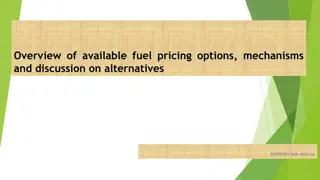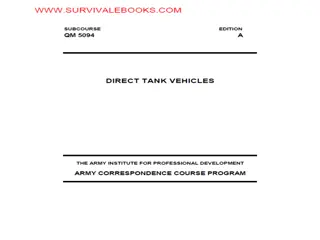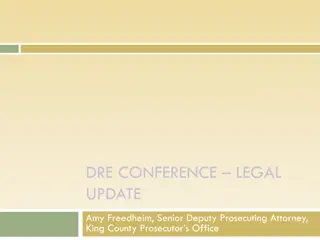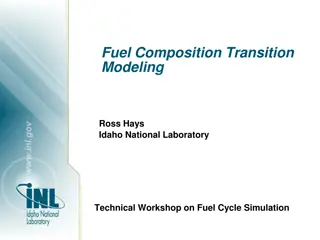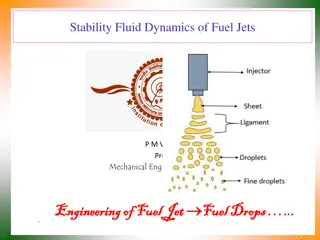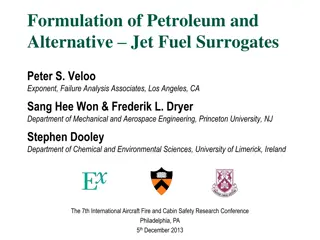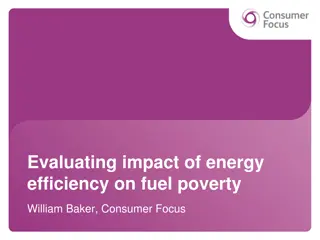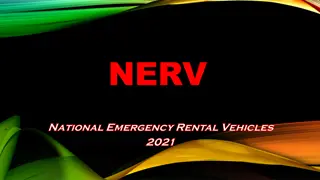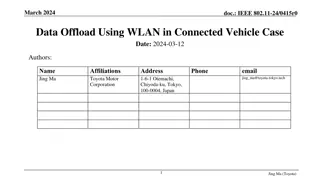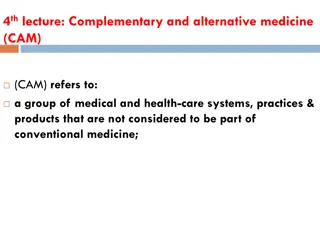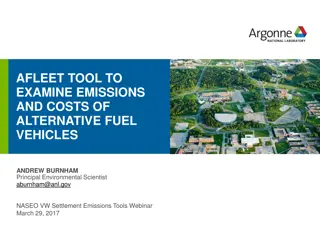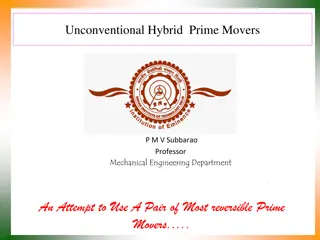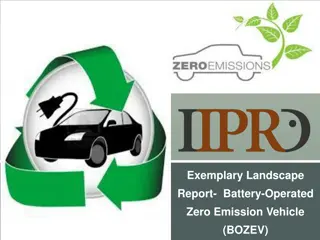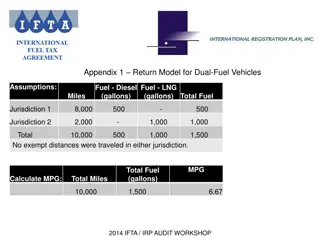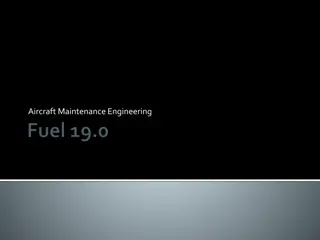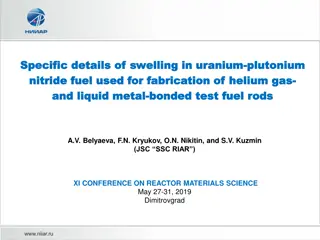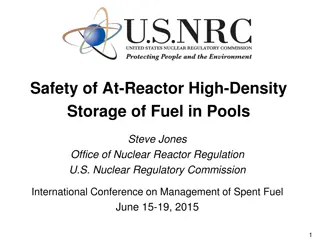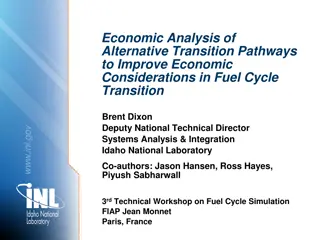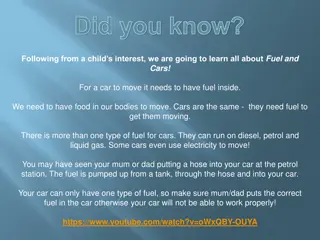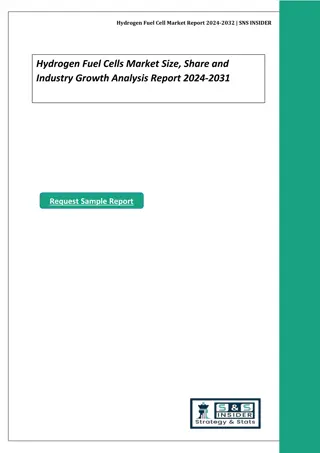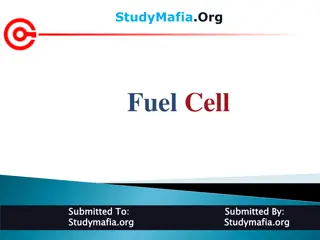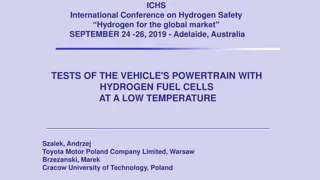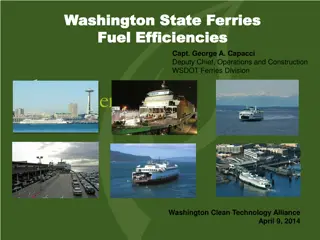Bunker Fuel Market
Bunker fuel is a fuel oil used in marine vessels. It is poured into the ship bunkers to keep the engines running. Ships use three types of marine fuels, which include high sulfur fuel oil, low sulfur fuel oil, and diesel oil. Presently, growth in awareness toward reducing environmental pollution and
2 views • 6 slides
Bunker Fuel Market
Bunker fuel is a fuel oil used in marine vessels. It is poured into the ship bunkers to keep the engines running. Ships use three types of marine fuels, which include high sulfur fuel oil, low sulfur fuel oil, and diesel oil. Presently, growth in awareness toward reducing environmental pollution and
1 views • 6 slides
Bunker Fuel Market
Bunker fuel is a fuel oil used in marine vessels. It is poured into the ship bunkers to keep the engines running. Ships use three types of marine fuels, which include high sulfur fuel oil, low sulfur fuel oil, and diesel oil. Presently, growth in awareness toward reducing environmental pollution and
6 views • 6 slides
Egypt Retail Fuel Stations Market
A fuel station, also known as a petrol station, gas station, service station, or filling station, is a retail outlet that sells motor vehicle fuel to vehicle owners. Fuel stations provide various fuels including diesel, petrol, gasoline, kerosene, and ethanol. The main components of a fuel station i
5 views • 6 slides
Typical Delivery Times for Fuel Delivery Services in Vancouver
Need fuel but can't make it to the gas station? The mobile fuel companies will bring gas,\ndiesel, or other fuels right to your location on demand. But you might be wondering how\nlong it takes for the mobile fuel truck to arrive once you request a Vancouver fuel\ndelivery. However, delivery times c
9 views • 4 slides
green hydrogen market
green hydrogen is used as fuel to provide a sustainable mobility alternative. Fuel cells make vehicles more efficient and quieter; using green hydrogen allows vehicles to travel longer distances with less refueling. The increase in demand for green hydrogen is also due to growing government initiati
1 views • 3 slides
Energy Consumption Test Methods for Heavy-Duty Commercial Vehicles in China
China has released energy consumption testing methods for various types of fuel vehicles, including traditional fuel vehicles, hybrid electric vehicles, battery electric vehicles, fuel cell vehicles, natural gas vehicles, and methanol vehicles. The standards cover test methods for fuel consumption a
4 views • 15 slides
Overview of Car and Van CO2 Regulation Working Group Meeting, 9th December 2021
The Car and Van CO2 Regulation Working Group convened on 9th December 2021 to discuss recent and upcoming legislative changes impacting CO2 emission regulations for vehicles. The meeting included agenda items such as collecting on-board fuel consumption monitoring data, manufacturer requirements for
0 views • 28 slides
Drive Clean Truck Incentive Program Details
Drive Clean Truck initiative in Chicago offers point-of-sale incentives to move fleets towards zero and low-emission vehicles, focusing on Class 2 to Class 8 trucks and buses. The program, funded by the Chicago Department of Transportation and administered by CALSTART, issued $11.3M for 288 trucks a
0 views • 9 slides
Preliminary Analysis of Fuel Dependence and E-Mobility in the Pacific
This study by PhD Candidate Edoardo Santagata at UNSW delves into the fuel dependence and potential for e-mobility in the Pacific region. It includes data collection on energy consumption, fuel demand, vehicle registrations, and scenarios for electric vehicle integration. Preliminary findings highli
1 views • 17 slides
Important Changes in Motor Vehicles Act 1988 and Motor Vehicles Amendment Act 2019
Central Government has announced amendments to the Motor Vehicles Act 1988 and Motor Vehicles Amendment Act 2019 effective from April 1, 2022. The changes include the implementation of Detailed Accident Report procedures, appointment of Nodal Officers for motor third party cases, and definitions rel
1 views • 18 slides
Fuel Pricing Mechanisms and Regulatory Framework Presentation
This presentation to the Portfolio Committee on Mineral Resources and Energy delves into the Basic Fuel Price (BFP) for liquid fuels, covering global fuel pricing forms, policy positions, key pricing mechanisms, regulatory mandates, and the intricate structure behind fuel prices. It explains how the
2 views • 28 slides
Update on Categorization of Automated Vehicles by OICA and CLEPA
OICA and CLEPA are updating the categorization of automated vehicles, introducing new subcategories and refining definitions for driverless and dual-mode vehicles. The work aligns with ongoing efforts in related groups and aims to enhance clarity in classifying different types of automated vehicles
0 views • 12 slides
Understanding the Fuel System of Diesel Engines
During operation, a diesel engine's fuel system plays a crucial role in delivering clean fuel to the combustion chamber. The system comprises components like fuel filter, fuel lift pump, fuel injection pump, atomizers, and high-pressure pipes. Proper maintenance is essential to ensure efficient oper
5 views • 12 slides
Optical Wireless Interconnection Link for V2V in Camping Trailer
Introducing a design concept for Optical Wireless Communication Link for Vehicular Assistant Technology (VAT), enabling V2V communication between living vehicles and other on-road vehicles. Utilizing back lights of living vehicles, this system aims to improve visibility and safety on the road, espec
0 views • 5 slides
Update on Informal Working Group Activities for AEBS in Heavy-Duty Vehicles
The Informal Working Group on AEBS for Heavy-Duty Vehicles has made significant progress in developing a draft regulatory proposal to revise UN Regulation No. 131. Key tasks include assessing accident situations, exploring a generic marker triggering AEBS, defining performance requirements, and more
8 views • 9 slides
Fuel Pricing Mechanisms and Regulation Overview
Explore the various fuel pricing options and mechanisms available, including a discussion on alternatives for fuel pricing regulation. The objectives of fuel price regulation, classifications of fuel pricing in the Pacific Islands, and options such as regulating fuel price and tendering national fue
1 views • 11 slides
Proper Petroleum Marking and Inspection Guidelines for Vehicles and Equipment
As a petroleum supervisor, it is essential to inspect vehicles and equipment to ensure proper markings, preventing commingling of products and ensuring safety. This lesson covers the inspection of petroleum markings on tank vehicles, safety markings for bulk transportation, marking requirements for
0 views • 152 slides
Hailey's Law Update: Mandatory Impound for DUI Arrests
Mandatory Impound under Hailey's Law requires a twelve-hour hold on vehicles used by individuals arrested for DUI or physical control. Non-commercial or non-farm transport vehicles must be towed, and vehicles with arrested drivers as the registered owner cannot be redeemed for 12 hours. Commercial o
1 views • 18 slides
Fuel Composition Transition Modeling in Two-Stage Recycling Reactors
Modeling the transition of fuel composition in a two-stage recycling reactor scenario poses a unique challenge that previous versions of VISION were unable to address. By tracking fuel mass and isotopics through various stages of the fuel cycle, VISION now enables the modeling of reactors with recip
0 views • 15 slides
Insights into Fuel Jet Stability and Dynamics
Explore the complex realm of fuel jet stability and dynamics, including topics such as Kelvin-Helmholtz instability, liquid breakup postulations, geometric features of fuel sprays, penetration of spray into air, and more. Gain a deeper understanding of fuel drop formation, spray parameters, structur
1 views • 18 slides
Advances in Aviation Fuel Surrogates and Computational Modeling
This study explores the formulation of petroleum and alternative jet fuel surrogates, coupling chemical kinetics with computational fluid mechanics for engine design, and the variability of aviation fuels. It delves into the concept of surrogate fuel models, previous research on jet fuel surrogates,
0 views • 20 slides
Understanding Energy Poverty and Its Impact on Fuel Poverty in Europe
Evaluating the impact of energy efficiency on fuel poverty, this study examines the emergence of energy poverty in the EU, factors driving fuel poverty across Europe, and UK's definition of fuel poverty. It discusses various policies and strategies implemented to address fuel poverty, emphasizing th
0 views • 16 slides
National Emergency Rental Vehicles Program Overview
The National Emergency Rental Vehicles (NERV) Program provides rental vehicles for personnel from various agencies responding to incidents that require specific vehicle types. This program is managed by NWCG agencies and is not available to contracted resources. Vehicles range from economy cars to h
0 views • 18 slides
Fuel Cycle Analysis Toolbox: Enhancing Understanding and Optimization
This presentation focuses on the analyses and evaluations essential for assessing the potential of a fuel cycle, emphasizing different time scales, system sizes, objectives, and audiences. It discusses the need for coupled analyses, various tools required, and opportunities for improvement through i
1 views • 11 slides
Data Offload Using WLAN in Connected Vehicles
The market for connected vehicles is rapidly growing, leading to increased data consumption. This document highlights the importance of offloading data from cellular networks to WLAN in connected vehicles. Current solutions like 802.11u are insufficient, necessitating new standards to address the ch
0 views • 10 slides
Overview of Complementary and Alternative Medicine (CAM)
Complementary and Alternative Medicine (CAM) encompasses diverse medical practices, products, and systems outside conventional healthcare. CAM includes treatments like acupuncture, herbal remedies, and meditation. Epidemiological data shows widespread usage, particularly for conditions such as back
1 views • 20 slides
AFLEET Tool for Examining Emissions and Costs of Alternative Fuel Vehicles
AFLEET is a tool developed by Argonne National Laboratory to analyze the emissions and costs of alternative fuel vehicles. It provides insights into the benefits of using different fuel technologies and helps in decision-making for vehicle fleet management. The tool includes calculations for emissio
0 views • 25 slides
Emerging Technologies in Alternative Prime Movers and Fuel Cells
Explore the world of unconventional hybrid prime movers, fuel cells, and low-to-zero emission vehicles through advanced technologies such as green hydrogen production systems, fuel cell electric vehicles (FCEVs), and more. Discover the potential of these innovative systems in revolutionizing transpo
0 views • 27 slides
Advancements in Battery-Operated Zero Emission Vehicles (BOZEV)
The report delves into the landscape of Battery-Operated Zero Emission Vehicles (BOZEV), highlighting their eco-friendly nature, cost-effectiveness, and reduced maintenance. It compares BOZEVs with fuel-propelled vehicles, emphasizing the benefits including zero emissions, low noise pollution, and s
0 views • 41 slides
Dual-Fuel Vehicles Return Model Analysis
The analysis focuses on a return model for dual-fuel vehicles, considering the fuel consumption, miles traveled, MPG, prorating of miles by jurisdiction between fuel types, and tax calculations for diesel and LNG fuels. It emphasizes the importance of accurately showing miles by state to avoid confu
0 views • 5 slides
Comprehensive Overview of Aircraft Maintenance Engineering and Fuel Systems
Explore the intricate world of aircraft maintenance engineering encompassing fuel types, storage, lines, valves, filters, tanks, and more. Delve into AVGAS and JET fuels, their properties, and applications in operations. Gain insights into fuel tanks construction, fuel lines management, and the impo
1 views • 25 slides
Investigation of Swelling in Uranium-Plutonium Nitride Fuel for Helium Gas Fabrication and Liquid Metal-Bonded Test Fuel Rods
This study examines the specific details of swelling in uranium-plutonium nitride fuel used for fabrication of helium gas and liquid metal-bonded test fuel rods. Key irradiation parameters, examination techniques, and the structural and phase state of SNUP fuel after low-temperature irradiation are
0 views • 18 slides
Enhancing Safety and Management of Spent Fuel in High-Density Storage
This informative presentation delves into the safety measures and regulatory changes surrounding the storage of spent fuel in high-density pools. Topics covered include the design of spent fuel pools, historical regulatory activities, past studies on fuel uncovery risks, and advancements in analytic
0 views • 17 slides
Economic Analysis of Alternative Transition Pathways in Fuel Cycle
This study explores economic considerations in fuel cycle transition by analyzing alternative pathways to improve efficiency and reduce costs. Strategic buildout and leveraging of low-enriched uranium for fast reactors are key strategies to enhance the economics of transition pathways. The research
0 views • 33 slides
Exploring Fuel and Cars: A Child's Guide
Cars need fuel to move, just like we need food to function. There are different types of fuels for cars, including diesel, petrol, liquid gas, and electricity. Learn how oil is formed, extracted from the earth, and processed into fuel. Explore the journey of fuel from oil rigs to your car's tank. Di
0 views • 6 slides
Hydrogen Fuel Cell Market
\nHydrogen Fuel Cells Market Size, Share & Segmentation By Product Type (Liquid-Cooled Type and Air-Cooled Type), By Technology Type (Polymer Exchange Membrane Fuel Cells (PEMFC), Phosphoric Acid Fuel Cells (PAFC), Solid Oxide Fuel Cells (SOFC), Dire
1 views • 8 slides
Understanding Fuel Cells: Definition, Working, and Applications
Fuel cells are electrochemical cells that generate electricity through reactions between fuel and an oxidizing agent like oxygen. They offer high efficiency compared to traditional power plants. The working of fuel cells involves hydrogen and oxygen reacting to produce electricity. NASA has utilized
0 views • 20 slides
Hydrogen Fuel Cell Vehicle Winter Testing in Poland
Poland, a major hydrogen producer in Europe, conducts operational tests of hydrogen fuel cell vehicles in winter conditions to ensure safety and efficiency. The tests, conducted on a Toyota Mirai car equipped with fuel cells, focus on operational safety at temperatures as low as -25 degrees Celsius.
0 views • 14 slides
Washington State Ferries Fuel Efficiency Initiatives
Washington State Ferries (WSF) is implementing various fuel efficiency measures to reduce fuel consumption, including propeller redesign, hull coatings, and operational changes. The importance of fuel efficiency is highlighted as fuel represents a significant portion of the operating budget. WSF has
0 views • 12 slides


